A lot has changed since we started this comic. The coherence and flavor of the narrative are far from the wondrous, perhaps even naïve, impression of seeing literal Gods among us. The best way to portray this contrast between then and now is through the protagonist, Laura Wilson, now Persephone. She is a literal representation of the ‘ascended fangirl’. And although this had always been her desire, the prize only got her an unhealthy dose of fatalist ennui. Of course, many factors played into that decay. But ultimately, the result is her going from a girl who was dying to live to a girl who is living to die.
Likewise, the joyous glamor is no more in the greater scope of the story. All we have left now is the big nasty blotch of uncertainty that Ananke left behind with her deeds. Her vengeful murder at the hands of Persephone helped not a bit. And now, we’ll be faced with the enigmatic entity at the root of Ananke’s murders. It won’t be pretty.
Issue #25
“Anger helps”
We pick up right where we left off, perhaps a fraction of a second later. Persephone virtually has Woden’s life on the tip of her fingers and she’s more than willing to bring an end to it. Now, as readers we are faced with the proverbial angel and devil on the shoulder. An irredeemable asshole’s death is certainly a plus, but it could well jeopardize whatever life remains for the rest of the Pantheon. Decisions, decisions.
But that’s Persephone’s perspective. Fortunately, Urdr’s presence manages to delay her just enough for a frightened Woden to state the rules. If he failed to check in once a day, all evidence of Ananke’s murder would come out. Interestingly, he’s the one to point out that revealing the evidence would affect her friends as well. Evidently, Persephone hadn’t thought about that.
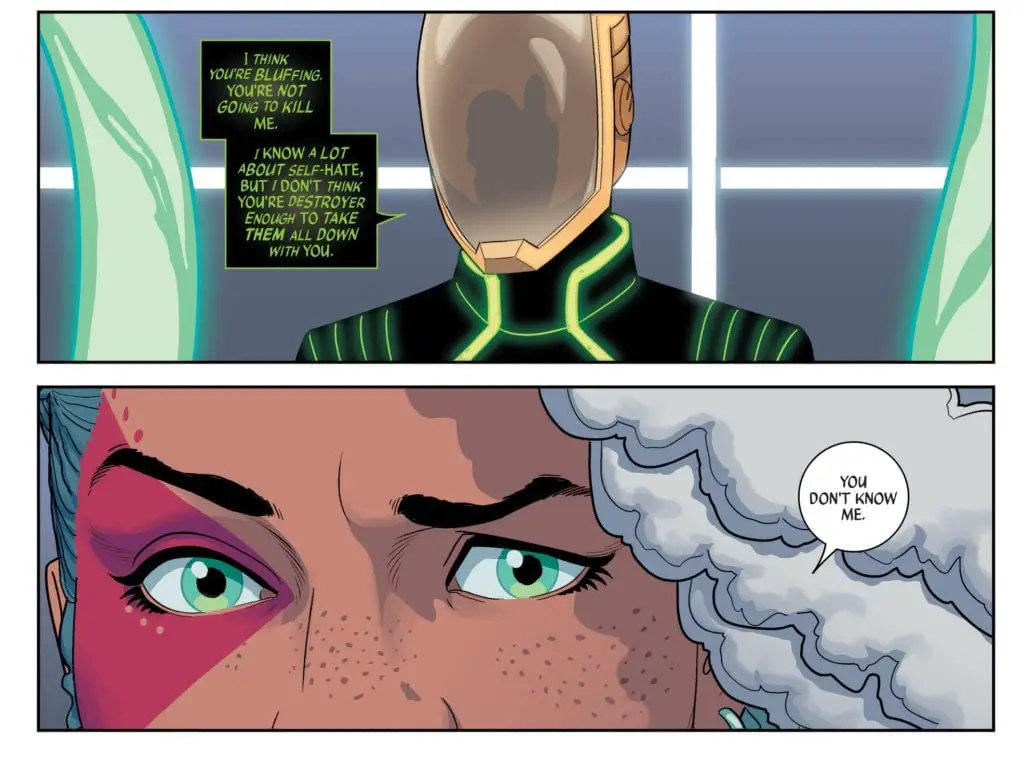
Persephone’s deathly temper is now defused, which creates a chance for some sobriety. After reassuring Urdr that he won’t be so careless so as to just forget to check in daily, he states that he too would be in trouble if the evidence came out. In a strange show of transparency (at least apparently), he offers a handshake to Persephone. We could interpret this as a way to say they’re all in this together and violence solves nothing. Nobody ever can say Woden’s a good guy, not even his mum. But this is probably the best course of action. Still, Persephone uses the handshake as a trap to bring Woden down to her turf, the Underground. Urdr is understandably and rather humorously infuriated about this.
Below in the Underground, Persephone uses her particular brand of divinity to intimidate Woden. Of course, ‘intimidate’ is only the basic purpose, and thus, somewhat of an understatement. Hellish psychological torture via underworld ensnaring is a more accurate way to describe it. Jamie McKelvie is a magnificent artist, and he has huge strengths all over the place. But his sequences of otherworldly qualities, such as ascensions to divinity and divine catharsis are absolute beauties in visual narrative.
In much the same fashion, Woden’s agony in Persephone’s realm is very effective. The scene through its simplicity effectively conveys the oppressive, smothering sensation of being lost in a boundless nothing. This is too much, even for an evil smart-ass, such as Woden.
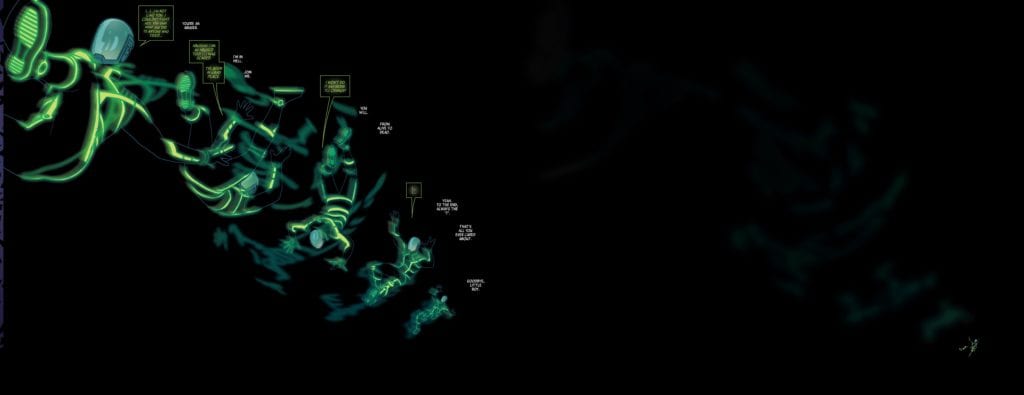
It turns out that Persephone’s little mischief had quite the effect, as they return to Valhalla. Woden, frightened out of his wits, claims to regret everything. He yields complete autonomy to the Valkyries and promises his services to Urdr’s research. The latter refuses his help, but Woden puts the cards on the table. Urdr and he are the only Gods capable enough to work out the mechanisms of the machine he built for Ananke. The rest either don’t fit the full criteria, or are merely Gods of debauchery and destruction. When Persephone asks where she fits, Woden says she is a wild card. Urdr agrees with this assessment as Persephone has always exhibited many strange quirks, even back when she was only Laura.
The discussion then moves to Ananke and the dubious validity of everything she ever said. Woden proposes to focus on the basics. First item on the list is their two year-long lifespan, if it is true and if there is any way to escape it. At this point, I’d refer you, dear reader, to the special issue 1831 where we explored this question in detail. There was both a scheme to escape this fate, as well as Ananke’s direct and indirect intervention to sever any possibility of success. Simply put, we don’t know if it would have worked, or if the two-year lifespan is just bullshit.
Second item on the list is the purpose of her ritualized murders, which leads us to “The Great Darkness”. Here, of course, is the great unknown, and the reason Persephone should have stayed her hand. They have no idea what it is or even if it is real or another one of Ananke’s lies.
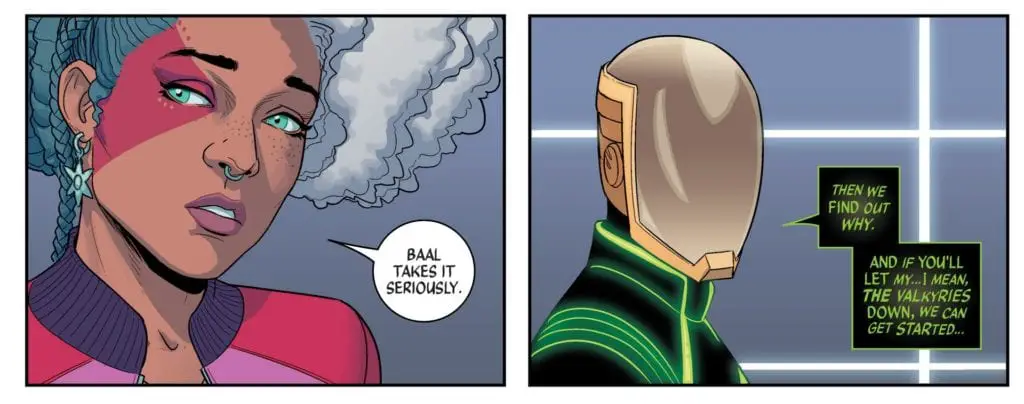
If we take a step back from the story proper, and look at the wheels at the beginning of each issue, something is clear. The Recurrence is always 12 Gods, except for the most current one. Persephone, being the thirteenth God, essentially broke that wheel. At this point, one may think Ananke had further reasons to pursue the “Destroyer”. It may not only be that she saw her as a menace to her plans, but also as a menace by herself. If we take into consideration the dissonance of her mood across various situations regarding the Gods’ murders and deaths, her actions may carry more than simple spite.
Back to the story proper, Woden and the Valkyries all leave to do their respective bits of homework on the matter. Despite his vow of cooperation, his blackmail plot is still operational. He remarks that he designed it in a way that would negate his own cowardice. And he actually has some validity in his decision. Persephone has shown that she cares little about most things and killing is coming too easy to her. If she were to lose her self-control, she could prove a menace to potentially all around her.
Therefore, the blackmail scheme becomes more a measure to keep her in check rather than to merely save Woden’s hide. Cass herself calls her out on this by text messages after Laura leaves Valhalla. In some way, Persphone acknowledges this, but her attitude in regards to it is ambiguous.
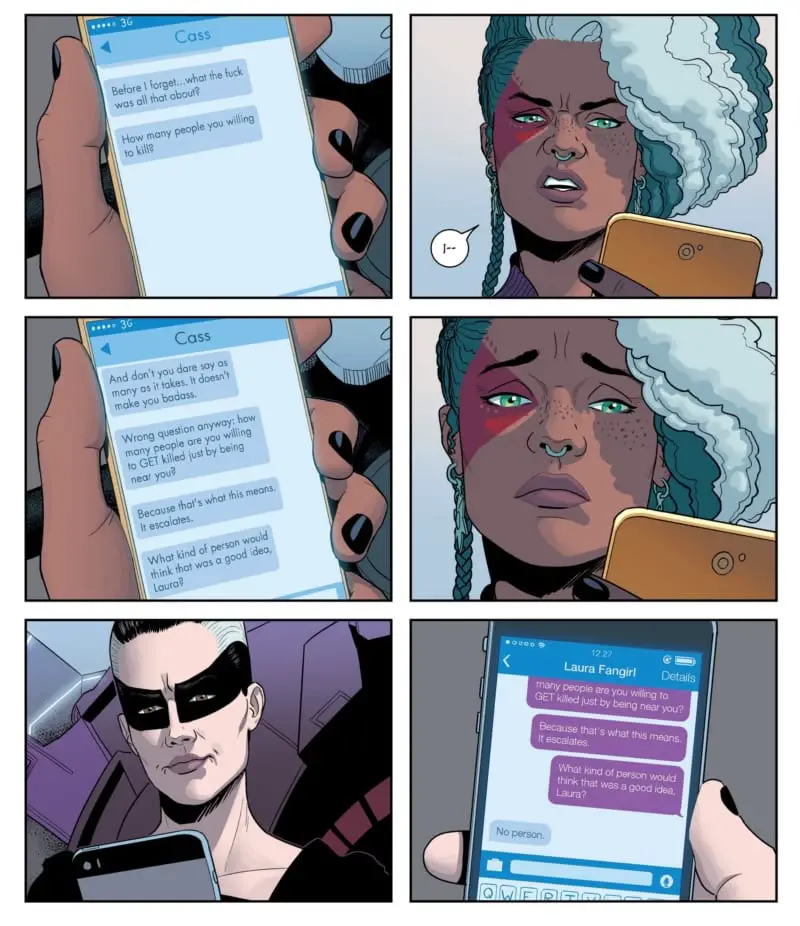
Later that evening, Baal, Persephone, Minerva and Owly watch the telly like a happy family might. But unlike a happy family (hopefully), they’re watching a program on their tormentor, Ananke. Baal thinks they should be watching something else but Minerva insists on watching. She still wants to work out the puzzle behind Ananke.
As they chat on, Baal remarks that he believes she told the truth about the Great Darkness. An interview with Amaterasu ensues, whom Minerva is not pleased to see, considering how Ami fled rather than save Minnie from Ananke. The conversation leaves her distracted, with her back to the windows, blind to the thing leaving Baal and Persephone agape. Behind Minerva, the windows break and shatter as a huge black mass takes the little Goddess.
Baal and Persephone charge after it, with the former ready to blast some divine thunder on this creature. Yes, we can see now that he was not wrong to believe in the existence of the Great Darkness. We’re in for a fight next issue, lovelies. Do stay tuned.
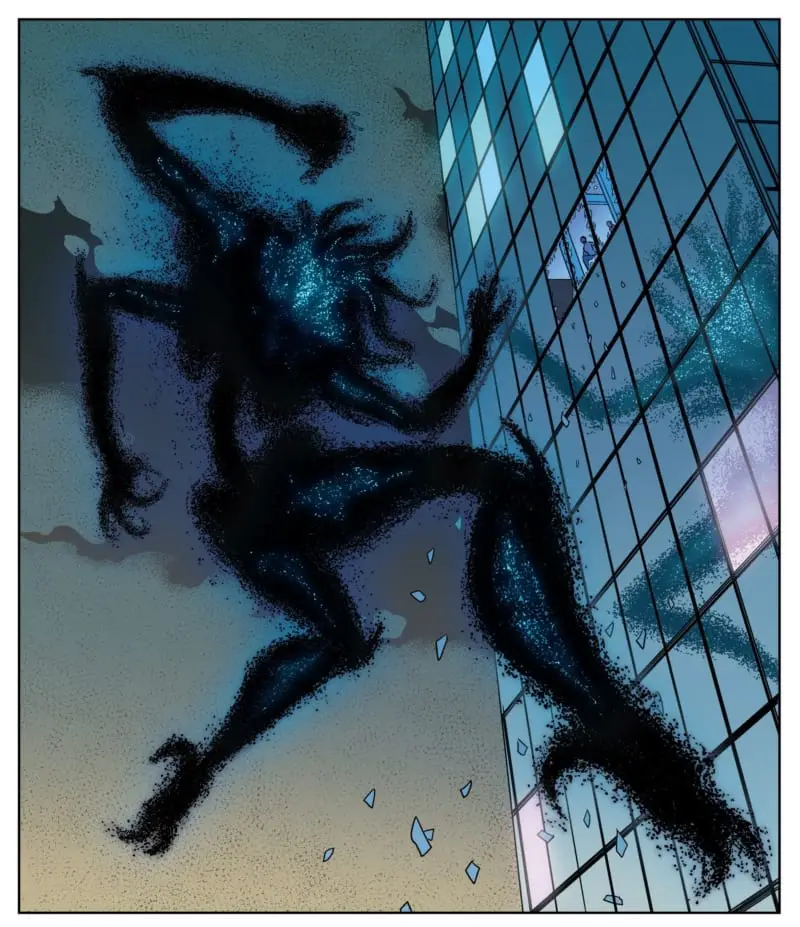
The Wicked + The Divine Issue #25 Credits
Writer: Kieron Gillen
Art/Cover: Jamie McKelvie, Matt Wilson
Images Courtesy of Image Comics

